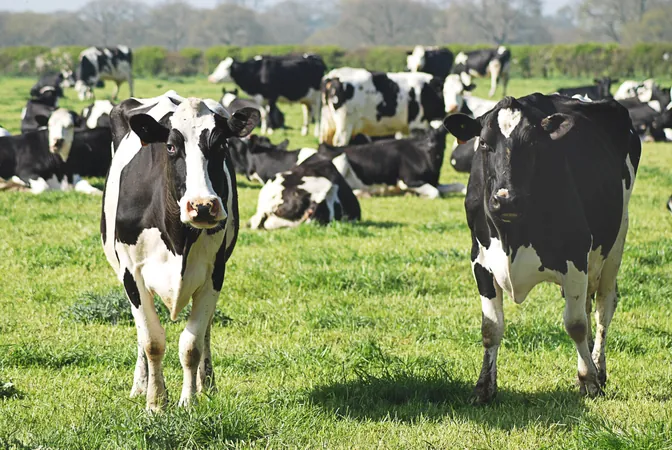
Unlocking Success: Scientists Present Game-Changing Solutions to the Global Nitrogen Crisis That Benefit Wallets and Planet!
2024-09-25
Author: Liam
In a groundbreaking analysis of the global nitrogen cycle, a team of 50 international experts, spearheaded by the UK Centre for Ecology & Hydrology (UKCEH), has unveiled a comprehensive guide containing 150 innovative "win-win" strategies. These measures promise to mitigate nitrogen pollution significantly while saving businesses billions across various industries.
Nitrogen is essential for life and is found in human and animal waste, synthetic fertilizers, and as a byproduct of fuel combustion. Yet, inefficiencies in critical sectors like agriculture, transportation, and wastewater treatment lead to an alarming 80% of reactive nitrogen escaping into the environment. The repercussions include deteriorating air quality, the formation of toxic algal blooms that threaten aquatic ecosystems, and exacerbated climate change.
A Global Toolkit for Action
The new guidance document does not limit itself to agricultural practices, although agriculture remains the largest nitrogen consumer and emitter. Instead, it broadens its scope to encompass all economic sectors and addresses the challenge on a global scale. A complementary online resource, the Nitrogen Measures Database, enables policymakers and stakeholders to explore detailed measures, including implementation strategies, costs, and benefits.
Among the key strategies recommended in the document are:
1. Optimized Fertilizer Use
Enhancing the efficiency of organic and synthetic fertilizer storage and application can lead to significant pollution reduction and cost savings for farmers.
2. Sustainable Farming Methods
The adoption of cover crops and reduced tillage practices will help retain nitrogen in the soil while also integrating livestock with crop farming.
3. Natural Filtration Solutions
Developing constructed wetlands can effectively prevent nitrogen runoff into water bodies, safeguarding aquatic ecosystems.
4. Nitrogen Recovery Innovations
Advanced sewage and food waste treatment processes can allow for the recovery of nitrogen, which could then be reintegrated into fields as a natural fertilizer.
5. Eco-friendly Fish Farming
Utilizing nutrient-rich sludge from fish farms as fertilizer for agricultural lands using low-emission techniques can optimize resource usage.
6. Cutting Transport Emissions
Increasing the adoption of electric vehicles and optimizing fuel combustion processes will also contribute to reducing nitrogen emissions.
7. Dietary Adjustments
Emphasizing a reduction in food waste and limiting the consumption of high-nitrogen footprint animal products.
8. Energy Generation from Waste
Implementing anaerobic digestion to convert manure and fish farm sludge into biogas while retaining the byproducts for fertilizer purposes.
The Financial Toll of Nitrogen Waste
Around 200 billion tons of nitrogen are squandered globally each year, translating into a staggering loss of up to $300 billion if measured against fertilizer prices.
Dr. Will Brownlie, the report's lead author, highlights, “Improving nitrogen management offers a remarkable opportunity to promote both environmental health and economic stability. An integrated approach across the nitrogen cycle is crucial for maximizing these benefits.”
The collaboration of over 40 institutes from 21 countries underlines the universal significance of sustainable nitrogen management, which plays a vital role in achieving many UN Sustainable Development Goals. By optimizing nitrogen use, food security can be enhanced, particularly in regions struggling with nutrient-deficient soils.
A Call for Circular Economy
The report champions the integration of advanced technologies such as satellite monitoring, data analytics, and artificial intelligence to deliver precise nitrogen management solutions tailored to specific locales. Professor Mark Sutton of UKCEH explains, “We aim to create a circular nitrogen economy that minimizes waste, decreases costs for governments, farmers, and wastewater facilities, while simultaneously boosting farmers' incomes.”
Isabelle van der Beck from the United Nations Environment Programme (UNEP) stresses the necessity of recognizing nitrogen as a multifaceted challenge tied to all economic sectors. The strategies outlined not only target international water pollution but also promise collective benefits for the air, climate, biodiversity, and economic growth.
The future of our environment and economy may well hinge on how effectively we can manage nitrogen—from farms to cities, every sector has a role to play in this vital endeavor. Are we ready to embrace this transformation?









 Brasil (PT)
Brasil (PT)
 Canada (EN)
Canada (EN)
 Chile (ES)
Chile (ES)
 España (ES)
España (ES)
 France (FR)
France (FR)
 Hong Kong (EN)
Hong Kong (EN)
 Italia (IT)
Italia (IT)
 日本 (JA)
日本 (JA)
 Magyarország (HU)
Magyarország (HU)
 Norge (NO)
Norge (NO)
 Polska (PL)
Polska (PL)
 Schweiz (DE)
Schweiz (DE)
 Singapore (EN)
Singapore (EN)
 Sverige (SV)
Sverige (SV)
 Suomi (FI)
Suomi (FI)
 Türkiye (TR)
Türkiye (TR)